- Transition from Greek world to Roman world, if it wasn’t for what he did, the Romans wouldn’t have found this preserved
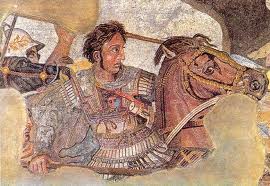 Greek empire
Greek empire - When Roman conquered what Alexander conquered they inherited the Greek culture, saw the transition of the two glorious eras
- Throughout the eastern Mediterranean, the Romans met with Greek literature, art, gymnasiums, acted as middle between the two great cultures
- The period after his death called Hellenistic Era
- Died at age 32, for most of his life he was on military campaign, a tactician, ranks up with Julius Caesar, as one of the world’s greatest military minds
Invasion Strategy (334-327)
- Inherits the kingdom of his father, Phillip, he was holding onto it by a thread, he was ruling areas that had been conquered by his father’s reputation, waiting to rebel at any sign of weakness shown by Alexander
- Started off with western coast of Turkey, Macedonia
- He decided to fulfill his father’s dying wish and invade the Persian empire
- Had to leave half of his military force behind or else all the Greeks and neighboring empires would revolt
- With 5, 000 cavalry, 21, 000 hoplites (main fighting force) and 11, 000 peltasts (pelt enemy, doesn’t sustain combat), he invades Persia
- Persian forces in Asia minor alone outnumbered him
- He had no money, he and his father’s military expedition had been so expensive, Macedonia at the time was in debt, nothing in the treasury to pay and support soldiers
- Given that he has subjects waiting to revolt back at home, limited resources and vast outnumbering of Persians, his soldiers 30+ of them decided to charge into Persia at lightning speed, to loot so their forces can acquire some wealth, so Alexander can fill treasury and pay the soldiers
- He was actually was going to use this small force to conquer all of Persia, the obstacles to conquer this region were enormous
- Iraq are had 200, 000 troops, US can’t even sufficiently hold off and gain rule of this region, but Alexander with 37, 000 troops, he attempted to take over Iran, Iraq, Egypt, Turkey, to claim that he was going to go through and conquer all of it was jaw-dropping edacious
- Couldn’t count on supplies nor reinforcements
- His strategy was to strike fast at every area of the Persian empire and leave before reinforcements could arrive,
- Strike quick enough that he could escape before the Persian forces came from all around the country
- This strategy counted on the fact that the Persian forces would fight and resist Alexander’s troops right away at each attack, instead of collecting their troops and centralizing their naval, or else he’d have to retreat
- Persians, like Alex’s own troops thought the expedition was simply to loot and they stopped him every time they could, nobody would have thought that he actually thought about conquering the empire with an army this size
Initial Invasion
- Battle of River Granicus (334): wanted to be trapped, his military tactics destroyed them and continued on this way
- As he continued on his way eastward, he had to fight and defeat all the Persian forces along the way, couldn’t afford future
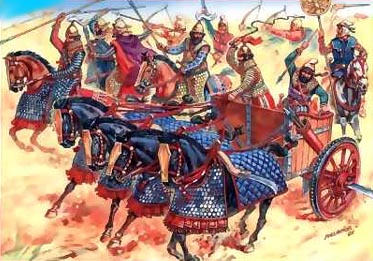 threat
threat - He had no fleet, Persians did have a fleet, and he had to get rid of it
- He took every single port so no ship could harbour by the shore, unlike modern sail boats, you can’t travel for weeks at a time, every couple of days, you had to “dry up” and park by harbour before setting out again
- In Peloponnesian Wars, the only way to defeat a naval was to have a naval yourself, the only way to conquer a city is to starve it
- This was the second military innovation, he had ballista and catapult, had his engineers measure angles and defeated the fleet, nobody had seen this innovation, using engineering to conquer a city
- Issus (333) yet another battle where he showed his military superiority
- In Egypt, Alexander was greeted by Amon Re, the oracle revealed that he was indeed son of God. Alex’s mother also claimed that Zeus impregnated here and that Phillip was only a stepfather
- He marched hundreds of km into the desert to visit this oracle
- His behavior after Egypt became increasingly indicative, he believed he was a god, he thought he was divine, he required people to bow down and worship him as a god, does everything in such a grand manner
- Although always a bit of a showman, arrogant, full of self-confidence
- Is he playing the role of the God, or is the role playing him?
- Gaugamela (331): as Alexander spent years conquering every port, the Persian king had time to gather their troops and in 331, they met in battle
- Prior to the battle, the Persian king offered half the empire and the Persian princess, promising him as the heir, he would have had the richer half of the empire, and Darius had the eastern half
- Alexander: I’ll take what I want if I want half; refer to me not as Macedonian king but as Persian king. He wasn’t Phillip, he didn’t try to bargain, he states what he wants to take and you either or agree or meet the consequences
- Siege tactics: crumble walls, make them fall, unlike the olden days had to bribe them or starve them
- Tactics (11.3): Alexander is always depicted on horseback, Darius is a noble king, wants to fight till the end
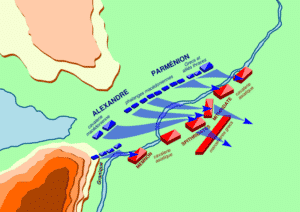
- His innovation was that cavalry, unlike the past Peloponnesian War, Persian Wars, it was always about the hoplites
- As long as you stand ground, and we hold shields together, what could a horse do? Hoplites had shifted focus from cavalry, chariots, cavalry mainly used for traveling and message delivering but Alexander reintroduced it
- His strategy, him and his cavalry would charge at certain soldiers, throw themselves at the soldiers, confusing them and wheel around attacking somewhere else
- Those soldiers were not defeated just staggered, then he would repeat, stagger, harass, and bewilder the enemy forces
- Turned out very effective, prevented enemy from communicating and coordinating their attack effectively, even though you’re numerically inferior, tactics made it possible to make you win with military superiority
- Incredibly effective and noble, he throws himself at them, when the Persians begin to surround his troops, he spins around and attack another bunch of Persian soldiers
- Our present concept on cavalry: Go where danger was greatest, bring salvation to his solders
- Persian king eventually just retreated, fled to the east to gather more support, leave Alex as undisrupted ruler, captured his family, his loot
- He conquered the states but had no control and couldn’t govern his empire
- Not coming as conquering force, going to have a true polis that is united, we’re going to be a comopolis, one people, one race, one big polis
- He was sincere, founded cities and told his soldiers to marry the native women, settle down there, entirely earnest, wanted to transform this whole region into one homogenous empire
- Saw no limit, wanted to keep going, conquer the whole world into one polis
- He kept going, leaving behind some soldiers, founded cities, do everything he could to make sure everybody lived intermittently
- Worked quite well for the people he conquered, welcomed him and worshipped him as divinity
- But his own soldiers were becoming very unhappy, in the midst of increased success, they wanted to go home, but they were forced to stay, worship him
- They were discontent with his strategy, can we stop now? Can we go back home to enjoy our riches?
- Persepolis (11.5): equivalent to present day New York City, the biggest city of the greatest empire, but this city burned to the ground, burning the largest library in the world, little is known about Persian culture
- Some historians say Alexander did that because he wanted to pay back what Persians did to Athens but some say he was drunk but he torched the city
- Julius Caesar burned down Egypt, and so much literature and culture was lost between the two of them
Expansion in the East
- “clean up the east,” most difficult part of his expedition, the time where his soldiers revolted and was forced to come back
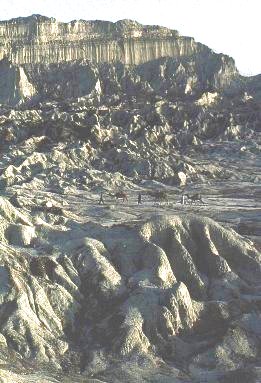 home
home - Proskynesis: genuine act of abasing yourself before a king, ritual act of showing submission obeisance, Alex demanded everyone did that to him
- To pass by the region, he had to go through mountains and hunt down enemies, very hard, similar to conditions in Afghanistan
- Roxanne, a princess that Alex married to attempt to gain favour of the people, but they did not take it too well
- The soldiers were fed up because they were not conquering wealthy cities, it was thankless work, no reward, taking years to pacify the tribes in the east
- Made it all the way to the edge of the Persian empires, he’s taken it all
- He stops at the Indus River and he tells his soldier that they are going to now conquer India, his soldiers revolt and refuse to go any further, illnesses were spreading, elephants, bad season
- March back to Persian capital, through The Gedrosian Desert, a brutal march
- Would Alexander be satisfied with the petty governing of the state? He didn’t want to administer any empire, he simply wanted to keep conquering
- Not temperamentally suited to being an administer, become extremely radical, drunk fits of anger, killed his best friend
- Alexander dies (323) of a high fever brought upon him due to binge drinking
- Absolutely not heard of in history in less than a decade to conquer the whole Persian empire, nothing equated his military superiority
- Whether you were Persian, Egyptian, Hebrew, Assyrian, if you wanted a position of authority, you need to behave like the Greek or Macedonian, because they were the conquering, dominating forces
- They would read Homer, train like a Greek, Hellenistic age where everyone would try to imitate the Greeks
- Dies leaving no heir, al his generals and troops left in the middle of this majestic empire
- “When I die, there will be funeral games like never before (to fight over what he left behind,” ironically
Alexander’s Influence on the Western World
- His empire disintegrated shortly after he died, into 4, 5 parts
- His influence was not his mighty empire, but his spreading of Greek culture, the concept of the cosmopolis: made it viable that the whole world could all be citizens, even under the Persian empire, the Persians were superior, rest of the racial minorities, Jews, and everyone were administered
- Greeks believed in knowing your limits “nothing in excess,” golden mean
- Alexander replaced that golden mean with the limitlessness, always eager, always forward looking, sky was the limit
- The Greeks never looked down on him for over indulging and drinking himself to death but adopted his idea of maybe there are no limits
- Even if he failed to set up a universal polis, he got people thinking about the idea, would it be possible that everyone belonged to one culture, be in a melting pot, Romans had the iron will to achieve what Alex dreamed of
- The Romans had a more fluid sense of citizenship, they would incorporate more people as Roman citizens, intermarriage, soldiers, everyone in the empire was a Roman
- The cosmos (11.7): everything there was, the Mediterranean was believed as the earth
- There was this excitement about everything impacted by Alex

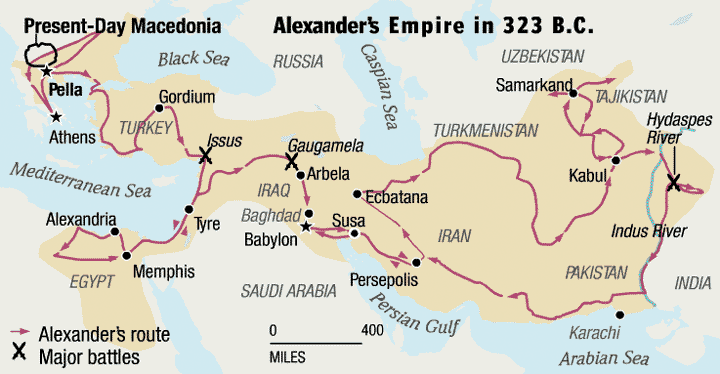
Your map has a factual error. The ancient Greek kingdom of Macedonia was on the northern Greek peninsula. The northern Greek peninsula today is the Greek province of Macedonia. What you have circled there as “present-day Macedonia” is, in fact, the unrelated newly founded Slavic State of the Former Yugoslav Republic of Macedonia. This area which in ancient times was known as Paeonia/Dardania before the Slavic invasion and only about 4% of its southern-most tip belongs to the Macedonia of history.